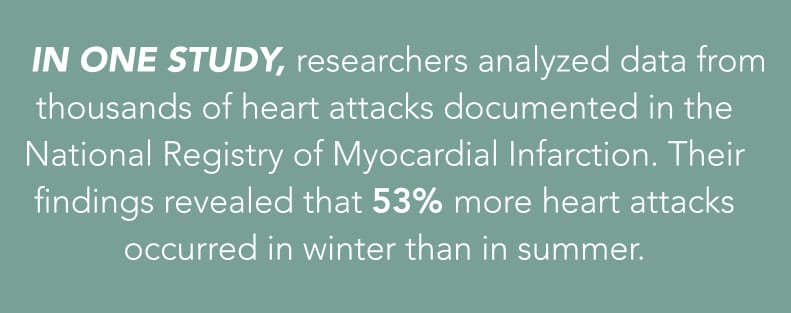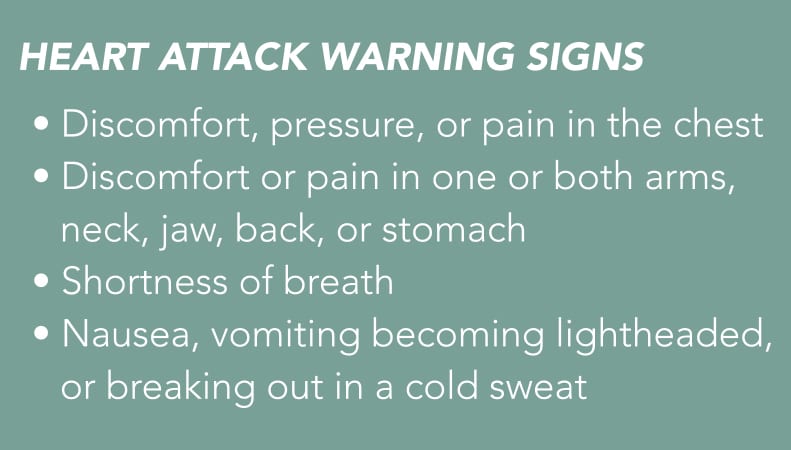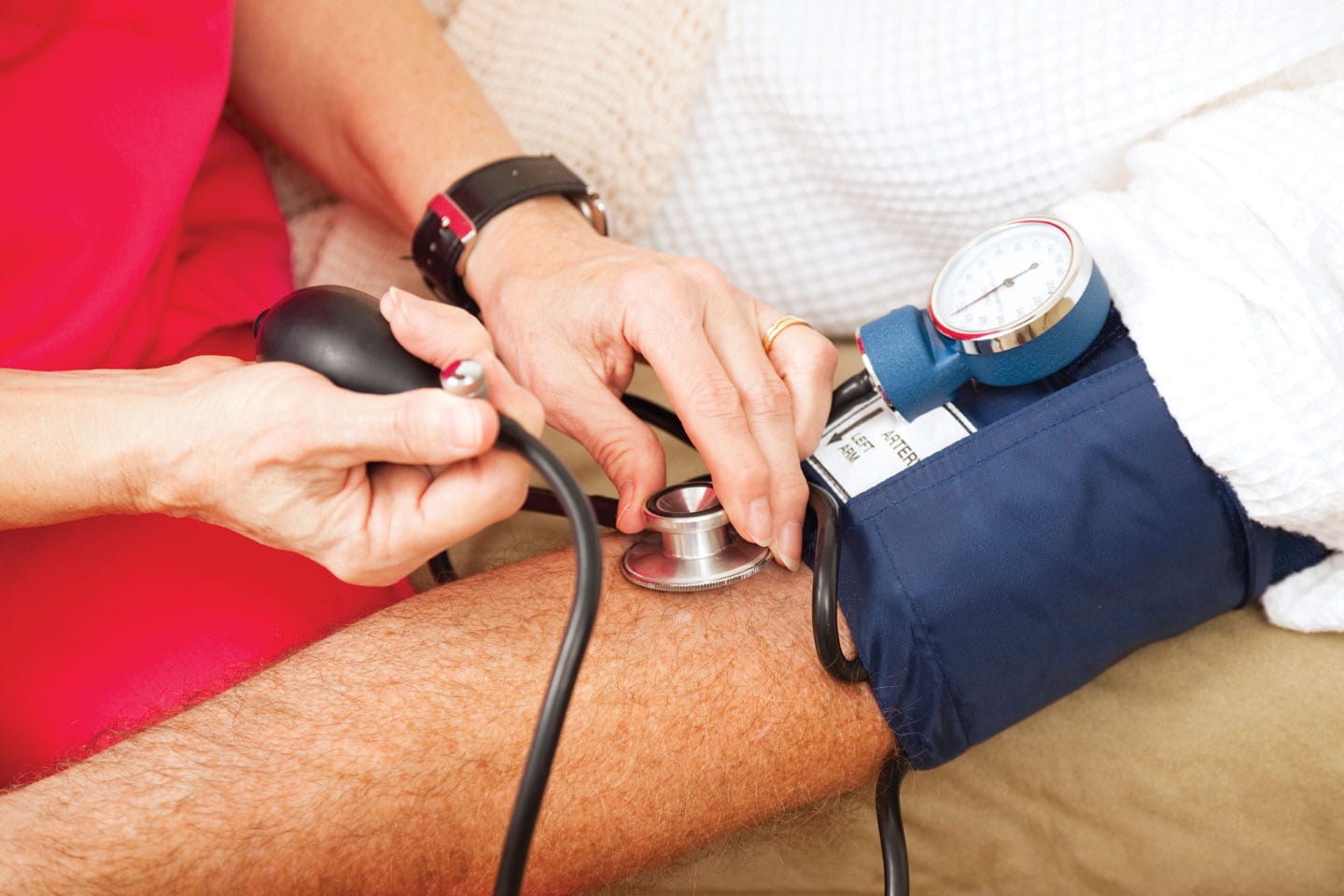The Link Between Winter & Cardiac Events
Ah, winter… the crisp, cold air means the season for hot cocoa, gingerbread, and Bing Crosby has arrived. Unfortunately for the elderly or those with a history of heart issues, winter also brings a spike in cardiovascular deaths.
What is it about winter that causes this upswing? Doctors and researchers still aren’t sure. They have some theories, though, beginning with how cold temperatures affect your heart and blood vessels.
By Andrew Shaughnessy





Interventional
Cardiologist and Vascular Medicine
Specialist,
Tennova Cardiology
How Colder Temperatures Affect Your Heart
When temperatures drop, your body responds by doing everything it can to keep you warm. One of the first ways it attempts to preserve heat is constricting the blood vessels in your skin – a mechanism called vasoconstriction.
For those of us who are otherwise healthy, vasoconstriction is a positive thing. It helps our bodies keep running when exposed to chillier environments. It protects our vital organs from harm. But for those of us who are at risk for heart disease, it can be problematic for a few reasons.
The first reason is that this constriction adds more resistance to the pumping function of the heart. This, in turn, raises, blood pressure. “High blood pressure leads to a higher need for oxygen by the heart muscle,” says Dr. Hady Lichaa, interventional cardiologist and vascular medicine specialist with Tennova Cardiology. “It also makes plaque in the heart arteries more likely to rupture, which can restrict vital blood flow and cause a heart attack.”
The second reason is that when blood vessels constrict, your heart receives a smaller supply of oxygen-rich blood. “This ups the work load on the heart by making it more difficult to pump blood through the body,” explains Dr. Carter Hemphill, interventional cardiologist at The Chattanooga Heart Institute at CHI Memorial.
This added strain is fine for people who are otherwise healthy. But for those with heart disease risk factors, it can increase risk of heart attack.
Want to decrease your risk of a fatal heart attack this winter? Start by educating yourself on potential triggers and how to counteract them. Let’s take a look at a few key strategies.






Interventional
Cardiologist and
Vascular Medicine
Specialist,
Hamilton Cardiology
Associates
Avoid sudden exertion in cold weather.
If you aren’t used to exercising or know you have cardiac risk factors, avoid sudden strenuous exertion when it’s cold. Remember: the cold has already raised your blood pressure and forced your heart to work harder. The extra blood pressure spike from sudden exercise can push you over the brink and into a cardiac event.
Shoveling snow, for example, sends 11,000 people to the hospital every year. While most of these cases are due to orthopedic issues, up to 7% involve a heart issue. “All too often, we see people who decided to shovel five feet of snow out of their long driveway,” says Dr. Eric Guerra, interventional cardiologist and vascular medicine specialist with Hamilton Cardiology Associates.
Why is shoveling snow problematic? Dr. Lichaa says that in certain people, the abrupt, strenuous nature of this activity forces the heart to accelerate at a dangerous rate. ”When
the heart is not used to exercise and is already compensating for narrowings in the heart arteries at rest, it cannot keep up with the suddenly high workload,” he says. “This can lead
to lack of blood flow to the heart muscle and possibly a heart attack.”
Get a flu shot.
It’s not just cold temperatures that can put you at risk. Even in warmer climates, heart attacks increase in winter. The reasons for this still aren’t completely clear, but one culprit to which health professionals point is flu season, which shows up just the same in sunny Florida as in the snowy Midwest.
Our immune systems tend to weaken in the winter, so when flu season comes around, stay on guard. The flu causes inflammation in the body, including the blood vessels and coronary arteries. “We don’t entirely understand the relationship between the flu and heart disease, but we do know there is correlation between inflammation and heart disease,” says Dr. Hemphill.
If you have a high risk of heart disease, get a flu shot to reduce your risk of getting sick. Several observational studies have shown the flu vaccine can reduce risk of heart attacks in high-risk patients. “While the protective mechanism isn’t fully understood, we know giving the flu vaccine to those with heart disease or heart failure can save lives,” says Dr. Guerra.
Take a deep breath.
Did you know that there is a direct connection between emotions and incidence of heart attacks? Sudden, intense emotions – whether happiness, grief, anxiety, or anger – can affect the heart’s electrical impulses and cause a sudden spike in heart rate and blood pressure.
“The heart is a very emotional organ,” says Dr. Lichaa. “In many ways it’s directly affected by the emotional centers of the brain and the autonomic nervous system that regulates reactions to stress.”
Chronic stress, which involves the release of adrenaline into the blood stream, is particularly problematic. According to Dr. Guerra, adrenaline is a known trigger for heart attacks. “Adrenaline and other stress hormones actually make your blood thicker and stickier,” he says. “They also promote clotting, which can trigger an event if someone has unstable plaque.” As great as the holidays are, they often bring family stressors, financial squeeze, or depression. Pair that with the physiological effects of cold temperatures on the heart, and you’ve got yourself a pretty good case for taking up yoga.






Interventional Cardiologist, The Chattanooga Heart Institute at CHI Memorial
Don’t fall off the wagon.
During the winter months, people tend to eat larger portions, eat fattier foods, and exercise less. Unsurprisingly, these habits lead to higher cholesterol, higher blood pressure, and weight gain – all factors increasing one’s risk for heart issues. “These seasonally related lifestyle changes happen everywhere, but they’re especially common here in the South,” says Dr. Hemphill.
When it’s cold, it’s all too easy to indulge in comfort foods and stay lazy. Don’t do it. Keep up your exercise routine and healthy eating habits. Get outside and walk for an hour each day. Lay off the cookies. Stretch. If you’re out of shape or have a high risk of heart issues, start slow and build up your cardiovascular system and strength. Finally, talk to your doctor about the most appropriate diet and training plan for your condition.
“If you have coronary artery disease or heart failure, discuss strategies prior to the winter season,” suggest Dr. Lichaa. “Your cardiologist can outline what precautions you should take and what your true limitations are.”



Know the warning signs.
While you can and should take precautions to avoid a heart attack, you should still know the signs and symptoms. “Risk does increase in winter. But no matter what time of year it is, be prepared to act,” says Dr. Hemphill. “Never use the season as an excuse to neglect symptoms or explain them away.”
Hollywood likes to portray heart attacks as sudden and dramatic. However, the reality is that most heart attacks start slowly and manifest as discomfort and tightness. A textbook heart attack is marked by pain in the chest that extends down the left arm. Sometimes, though, a heart attack will just feel like a pulled muscle in the chest or back, with pain lasting more than a few minutes and increasing and decreasing in intensity.
Whether you are at risk of a cardiac event yourself, or simply know someone who might be, have a game plan. If you notice any warning signs, even if you aren’t sure it’s a heart attack, play it safe. Call 911 and go immediately to the hospital. It could save your life.
See Related Articles










